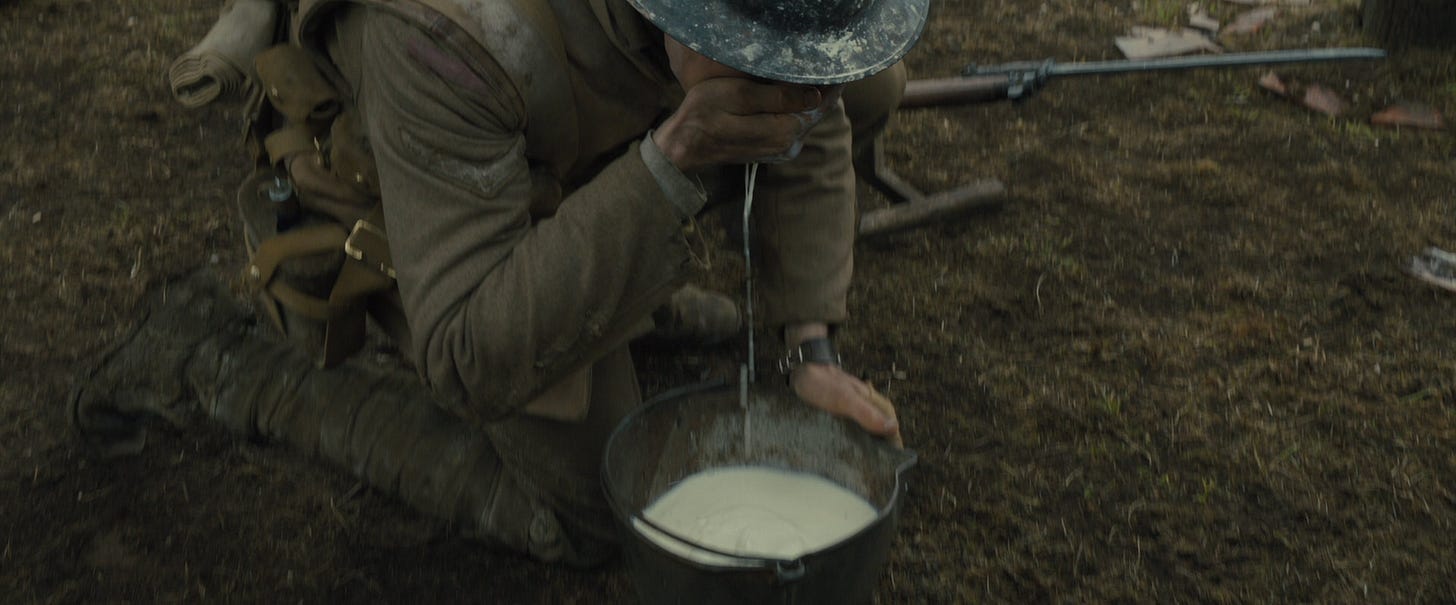My third son brought a dozen or two of his college friends over last night to watch Sam Mendes’s 1917, and on this, my fourth viewing, my deep respect and affection for the work continues to grow. Masterfully conceived and executed, perfectly and stunningly shot, and an absolute masterclass in building tension, it’s an astonishingly powerful film—a deeply-rewarding story of heroism, steeped in suffering and sacrifice.
Crafted with confidence and restraint in equal measure, it is a film packed end-to-end with memorable scenes—Lance Corporal Will Schofield’s flare-lit race through the eerily-gorgeous Écoust-Saint-Mein; Lance Corporal Tom Blake’s shocking death, foreshadowed by his unwillingness to take a life even in lowly rodent form; the rat, and the terror it precipitates; Schofield’s pitch-perfectly-meloncholic meeting with Lieutenant Joseph Blake, Tom’s brother, captured (according to cinematic legend) on the first take; the cherry blossoms drifting softly down over Will’s moment of complete exhaustion, followed by his horrifying, desperate scramble across the water-logged bodies of his fellow soldiers; the quiet bookends around the tortuous journey, Will resting at the foot of the tree, Nature watching over him as Humanity prepares to tear itself apart; the realization dawning on Will’s face that the only way to complete his impossible mission is to leave the safety of the trench (and the spell-binding action sequence that follows)—It’s hard to pick a “favorite” moment from a film filled with so many moments of greatness. Yet for me, at least on this viewing, it was easy.
It’s the milk.
SCOFIELD
I have food. Here. I have these. You can have them. Here, take them all, for you and the child. Here.He empties his rations onto the mattress, a bounty in this barren place. Lauri looks at them, aching with hopelessness. Schofield doesn’t understand.
LAURI
Elle ne peut pas manger ça. Elle a besoin de lait...
She can not eat that. She needs milk...
At the time, Will’s discovery of the milk is nothing more than a brief respite in the midst of the bitter relentlessness of their journey, a gentle reminder of a gentler time back home, much like Tom’s wistful reflection on the cherry trees a few minutes earlier. It feels almost like a throwaway, an unexplained, unimportant morsel that provides a bit of depth and detail to the film, and nothing more.
But when the young woman wishes, hopelessly, for the milk that will save this helpless young child, Will’s actions from earlier that day rush back to him (and to the audience) with a sudden relief that leaves him (and us) gasping. Suddenly, in the midst of the pain and loss, we are reminded that nothing is random, and nothing is without purpose. That small, seemingly meaningless moment earlier in that desperate day becomes vitally, profoundly important. For that frightened young woman and the innocent baby thrust suddenly into her care, the milk is life. It is everything.
There’s a kindness to that moment that is breathtaking to me, even now—a reminder that so many things in the film (or in life) that seem meaningless or hopeless are neither. These puny humans scrabbling in the muddy battlefields of The Great War are anything but unimportant; their actions, anything but accidental. Everything is orchestrated by the only One who can see and understand what it all means. At the film’s opening, General Erinmore quotes Kipling when pressed on why no one but Schofield and Blake are undertaking this seemingly-suicidal mission: “Down to Gehenna, or up to the Throne, He travels the fastest who travels alone.” But the story of the milk gives the lie to Erinmore’s weary cynicism.
We never travel alone.






